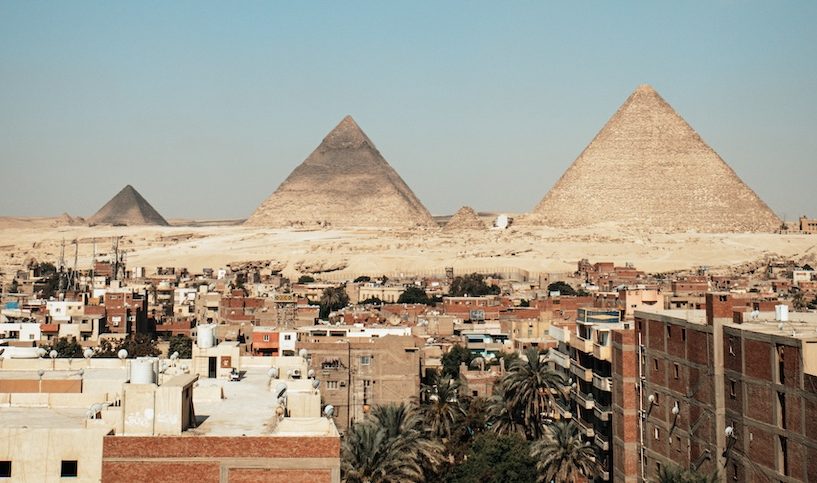He grew up next to the Pyramids. If he were to take the stairs all the way to the rooftop, he could see their ghostly geometry in the Giza haze. But these days he never goes to the rooftop, too many kids go there to smoke, to do who knows what. The minute he opens the rooftop door there is a giant scurry as they rush to hide behind the water tanks, thinking it might be their fathers, or worse, their mothers.
Truth be told, over these many years the Pyramids have become nothing special, three grand stony points of rock, and that’s that. His cousin in Aswan says he’s lucky to be so close to ancient history because all he has is a dam that’s not so ancient. Still, the Pyramids are important, one of the Seven Wonders of the Ancient World, say the guidebooks, and when it comes to the ancient world the tourists are relentless. The Chinese are the worst, or the best, depending on who you ask. Even when he can’t see the Pyramids, he knows they are there, their dusty bigness filling up the desert.
He wants to leave Egypt. He has had his fill of artifacts and tombs and Howard Carter wanna-be’s; not to mention the many cousins and friends who believe life is all about the WWE, a new video game, who think Liverpool’s Salah should be the next president, who think……
He had heard good things about South America. There is not much in the way of deserts there, a lot of green, even jungle. Not too long ago, two school friends had saved enough money to visit something called Patagonia for a summer and had invited him to come with them. He’d like to, he said, but two things held him back; thing number one, no money and thing two, his mother. They said they could help with the money part. “Yes, thank you, my friends, but as you well know that is the easy part.” They laughed even though it was not meant to be funny.
That night he decides to visit the rooftop and there, as expected, is a group of teen smokers who turn wide-eyed to him, the glow of their cigarettes suddenly vanishing. Once they see it is only him, the glow of their cigarettes return and they go about their rooftop business. Meanwhile, second-floor Ahmed is at the far corner of the rooftop, talking on his phone. He sees him and quickly finishes his talk. They shake hands even though they shook hands this morning at the café, and then in the street three hours later. Ahmed is in college and wants to be a businessman like his father and uncles. Ahmed thinks Germany is a better idea than South America. Two of his cousins are living, working, in Hamburg, he says. “They like it and everybody speaks Arabic in their neighborhood. It is like a mini-Cairo they tell me.”
This Arabic part does not impress him, and he says so, “Well, might as well stay here if it’s all about the language, sah?”
“This is true,” he replies and turns to look into his telephone.
Ahmed’s ‘this is true’ is, he has learned, Ahmed’s way of saying but not saying ‘let’s talk about something else.’ And so they do: about football—always football—about aunts who insist they marry: ‘What’s taking you so long? What’s the problem? I have a friend whose daughter would be the perfect match,’ and so on.
There is a coffee shop he goes to almost daily. It is not too close to his apartment, which is a good thing. When he walks in they call him by his first name, which always makes him feel good, and the times they are too busy to welcome him, they know what he eats and drinks and bring it to his table. This, too, makes him feel good. And yet, he feels the need to leave this place next to the Pyramids.
Not too long ago, a friend, Khaled, saw him sitting at the cafe all alone and decided to sit with him. Although they greeted each other, Khaled was not really interested in talking, he just wanted to sit next to a familiar face. He has always liked this about Khaled, and they sip their tea in silence while some football match played on the overhead TV screen. It wasn’t long before Khaled was done sitting next to a familiar face and got up to leave. He is not offended by this silence; in fact, nowadays, it makes perfectly good sense. With Khalid gone, he let his mind wander to things like food—although he was not hungry—to a thumb that was sore, even throbbing, and then to some radio that was playing a song that he used to know the name of, once. In the end, he whispered in what he thought was perfectly good English, “So good to see you, and how are you this fine day?”
But then came that Tuesday morning in November.
As he started for the front door, she, like always, said, “Good-bye, see you later and don’t be late for lunch.”
“Okay, Taman.”
But only moments later—her good-bye still an echo–his phone beeps, and although he does not recognize the number he answers it anyway, and it is Mrs. Kamel, the upstairs neighbor, and she is frantic, screeching, “She’s in the middle of the street and there is blood everywhere, and Oh my God. Ya ‘allaaah”. Hurry before it is too late. Too late. Oh my God, too late.” Walking with her shopping bag, minding her own motherly business one minute and the very next flat on her face in the middle of Pharoah Street, lines of blood racing to the kerb.
Many weeks later, even months, he is sitting on his bed, looking at his thumb that has not stopped aching, thinking that he no longer has to worry about mother not letting him go anywhere, but the very thought of it shames him because he should be thinking, feeling something else, anything else. And yet, thinking back to the school friends who had invited him to go with them to South America that summer and now he could, can, …. She is gone, and so there are no more barriers, nothing to hold him back. Meanwhile, more guilt comes rushing in. But there is that something else that refuses to go away: Mrs. Kamel, the neighbor, when she called him that day, screaming, begging him to hurry, how did she get his telephone number?
Photo by Jessica Kantak Bailey on Unsplash.











